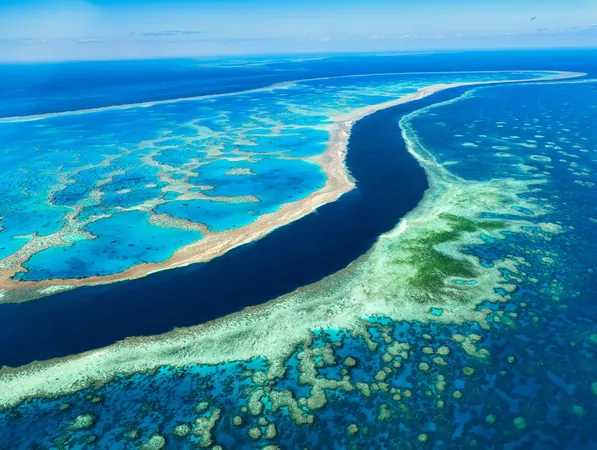
Catastrophic Coral Bleaching Hits the Great Barrier Reef: A Climate Emergency Unfolds
2025-01-24
Author: Wei
A shocking new study reveals that coral bleaching on Australia’s Great Barrier Reef has escalated to 'catastrophic' levels, with alarming implications for one of the world’s most cherished natural ecosystems. As ocean temperatures reached record highs in 2024, over 50% of the monitored corals near One Tree Island perished during the most severe bleaching event the reef has ever experienced.
Unprecedented Heat Waves and Their Devastating Effects
The intense marine heatwaves caused corals to expel the symbiotic algae that give them their vibrant colors, leading to a phenomenon known as "coral bleaching." This process not only affects the aesthetic beauty of the reef but also critically weakens the corals, making them susceptible to disease and death. Alarmingly, last summer marked the seventh mass bleaching event recorded in the region. The ongoing combustion of fossil fuels is exacerbating global temperatures, fueling these heatwaves and directly impacting fragile coral ecosystems.
The situation was further complicated by the El Niño weather phenomenon, which contributed to unprecedented warm ocean waters. In particular, studies indicated that coral colonies in areas previously considered resilient to extreme temperatures were now showing devastating responses to heat.
Extreme Coral Mortality Rates Documented
Research conducted by scientists from the University of Sydney tracked 462 colonies on One Tree Island over five months. By the end of the observation period, 370 of these colonies had bleached, and over half were dead by July. Some coral species faced staggering mortality rates, nearing 95%. Furthermore, the Goniopora species suffered additional devastation, falling victim to black band disease, further stressing their already compromised health.
Dr. Maria Byrne, the lead author of the study, emphasized the dire need for immediate action to safeguard coral reefs, affirming their essential role in biodiversity, food security, and coastal protection. Shockingly, despite the location's remote and protected status, it fell victim to this extreme heat wave, showcasing the widespread nature of climate change impacts.
The Global Implications of Reef Degradation
Covering approximately 133,000 square miles, the Great Barrier Reef is the largest coral reef system on the planet. It is home to an extraordinary diversity of marine life, including over 1,500 fish species and more than 400 types of hard corals. The reef also plays a significant role in Australia’s economy, predominantly through tourism, making its preservation a global priority.
However, as more frequent and severe bleaching events emerge, corals find it increasingly challenging to recover. This troubling trend indicates that mass bleaching might now occur every two years, intensifying calls for urgent global action to meet climate targets and reduce emissions.
A Bleak Future for Once Resilient Areas
The recent bleaching not only impacted previously affected regions but also extended to areas that had evaded such disasters until now. Even coral species previously deemed resilient exhibited signs of stress and disease. Marine scientist and co-author Shawna Foo expressed her devastation at witnessing the unraveling of corals in previously unaffected areas, reinforcing the severity of the ongoing crisis.
Urgent Action Required to Combat Climate Change
Severe bleaching events have plagued the Great Barrier Reef in years past, including 1998, 2002, 2016, 2017, 2020, and most recently, 2022. The stark reality of these events, especially coinciding with La Niña periods, raises critical questions about the resilience of the reef to future climate extremes.
The findings of this study—now published in the journal Limnology and Oceanography Letters—underscore the increasingly fragile state of coral ecosystems worldwide. As coral bleaching becomes a harsh reality in many areas, the survival of these vital ecosystems depends on cohesive global efforts aimed at limiting temperature rises and radically reducing greenhouse gas emissions. The urgent plea is clear: we must act now to preserve the planet’s vibrant coral reefs for future generations.
As we stand on the brink of an environmental crisis, the fate of the Great Barrier Reef hangs in the balance. Will we heed the warnings? It’s a race against time, and the future of our oceans is at stake.



 Brasil (PT)
Brasil (PT)
 Canada (EN)
Canada (EN)
 Chile (ES)
Chile (ES)
 Česko (CS)
Česko (CS)
 대한민국 (KO)
대한민국 (KO)
 España (ES)
España (ES)
 France (FR)
France (FR)
 Hong Kong (EN)
Hong Kong (EN)
 Italia (IT)
Italia (IT)
 日本 (JA)
日本 (JA)
 Magyarország (HU)
Magyarország (HU)
 Norge (NO)
Norge (NO)
 Polska (PL)
Polska (PL)
 Schweiz (DE)
Schweiz (DE)
 Singapore (EN)
Singapore (EN)
 Sverige (SV)
Sverige (SV)
 Suomi (FI)
Suomi (FI)
 Türkiye (TR)
Türkiye (TR)
 الإمارات العربية المتحدة (AR)
الإمارات العربية المتحدة (AR)